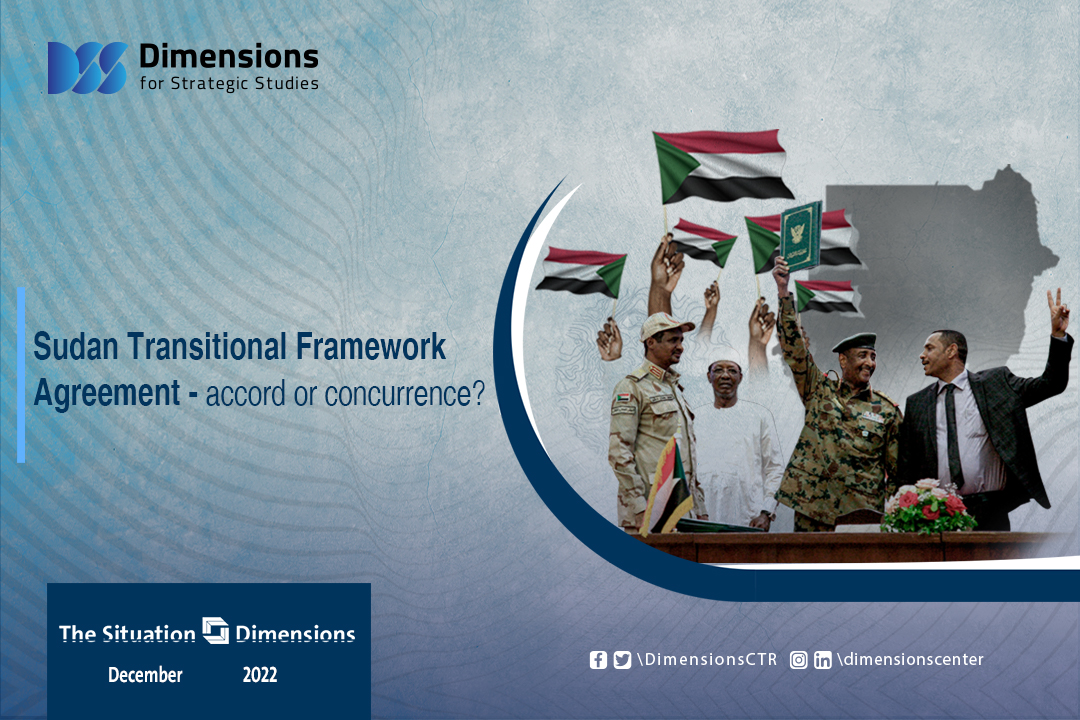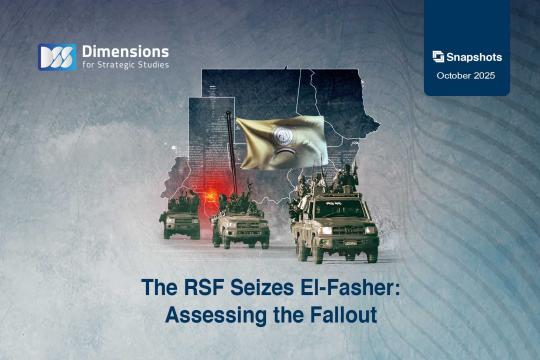
Sudan Transitional Framework Agreement - accord or concurrence?
2022-12-121732 view
On December 5, 2022, the military component in Sudan and a number of civilian forces signed a framework agreement to resolve the political crisis in the country. The agreement included a number of basic axes, including: general principles (15 principles), transition issues and tasks (10 issues), transitional power structures (13 items), including the stipulation that "the revolutionary forces signatory to the political declaration shall consult to choose a limited civilian sovereign level with honorary tasks that represent a head of state, a symbol of sovereignty and a leader of the regular agencies." The agreement also included a number of texts on the regular agencies in the Republic of Sudan (the armed forces, the rapid support forces, the police, and the General Intelligence Service), stressing that the armed forces are a professional national non-partisan institution formed and structured in accordance with the law and have the duty to protect the country, its unity and sovereignty, and maintain its security and the integrity of its territory and borders.
As for the Rapid Support Forces, they are, according to the text of the agreement, "military forces that follow the armed forces and the law defines their objectives and tasks, and the head of state is the supreme commander of the rapid support forces", and "within the plan of security and military reform, which leads to a single national professional army, rapid support is integrated into the armed forces according to the agreed timetables."The issues of the final agreement revolved around justice and transitional justice, in which it was stipulated to include (all those who have been affected by human rights violations since 1989 until now), the issue of security and military reform, the Juba Agreement for peace in the Sudan and the completion of peace, and the dismantling of the 30 June regime (the text said that it: kidnapped the Sudanese state and its institutions. The structure of the 30 June regime must be dismantled in a way that adheres to the rule of law, respect for fundamental rights, and commitment to resolving the crisis in eastern Sudan.
The issues of the final agreement revolved around justice and transitional justice, in which it was stipulated to include (all those who have been affected by human rights violations since 1989 until now), the issue of security and military reform, the Juba Agreement for peace in the Sudan and the completion of peace, and the dismantling of the 30 June regime (the text said that it: kidnapped the Sudanese state and its institutions. The structure of the 30 June regime must be dismantled in a way that adheres to the rule of law, respect for fundamental rights, and commitment to resolving the crisis in eastern Sudan. The agreement establishes a transitional period of 24 months, starting from the date of the appointment of the Prime Minister and ending with the holding of comprehensive elections.
While stressing the importance of welcoming and supporting reactions to the agreement, from inside and outside the Sudan, as well as some reactions rejecting or having reservation about them, it was striking to note the statements of the Chairman of the Sudanese Sovereignty Council, Abdelfattah al-Burhan, who said: "What happened was not an agreement between the military component and political forces, but a consensus", and that "there is no exclusion for anyone", and "the groups that reject the framework agreement may have an external agenda; and he accused some political forces of being "arrogant and demanding to be in the leadership cabin". He also said: "Groups belonging to Islamic organizations were monitored to have been after regaining power through the exploitation of the armed forces". He stressed that no party will be allowed to use the army to seize power, and he refused to talk about the existence of external dictates behind the signing of the agreement, saying: “This "contradicts logic and reality”
Among the texts and statements, several basic observations can be found:
First, there are serious challenges to complying with the provisions of this Agreement, which are linked to the very fragile security, political and economic situation that the Sudanese State is experiencing.
Second: Talking about it being a consensus rather than an agreement negates the compulsory or mandatory status of the military component, whose symbols ensured that it remains at the head of the authority and controls its institutions and tools during the period of the agreement.
Third: The agreement came under regional and international sponsorship, and the roles of the participating parties were not limited to sponsoring but extended to exerting real pressure on all participating parties to accept the signing. The armed forces under Al Burhan have their external extensions, and the rapid deployment forces have their external extensions that may sometimes coincide or conflict with the extensions of the armed forces. The forces of freedom and change have their extensions as well. These extensions of all the parties mentioned count on policies of containment to gain more time, through which they can reorganize their internal situations and their regional and international interactions.
Fourth: The stipulation in the transitional justice file that "those who have been affected by human rights violations since 1989" opens the way to security, military and judicial prosecutions for all those who participated in the governing of the former regime, which does not augur well for the establishment of genuine political stability.
Fifth: There is a contradiction between saying "no one is excluded" and providing for the targeting and dismantling of some forces and organizations, without realizing that all those who participated in the Sudanese political scene, without exception, during the last three decades, including those who are in control today, have their political mistakes; and excluding some from accountability at the expense of others, opens the way to tension; which can increase tension with the presence of parties already rejecting this agreement.
Hence, it can be said that the challenges surrounding the agreement or consensus do not stop at the limits of the written texts, but in the internal political, economic and security contexts, as well as in regional and international interactions, and their ability to manage these challenges and prevent the explosion that lies in the details





